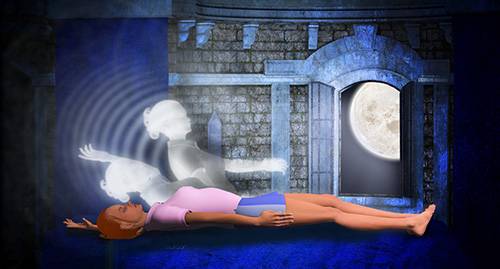
Dreams themselves are not a concrete concept properly understood, though they have been studied intensely. Some questions have been answered though, relating to what dream context could relate to, what stage of sleep dreams occur most in, and how far into your sleep dreams begin to happen.
What is Dreaming?
Dreams occur in a state of semi-consciousness which is outlined by the cognitive and emotional process of your mind while it’s partially asleep. This intriguing phenomenon plays out as if a movie were rolling behind your eyelids. You could have a pleasant, humorous, or scary dream for reasons explained later.
Typically, you cannot control the outcome of your dreams unless you experience a lucid dream, but even then, you discover that you’re in a dream; you didn’t initiate the dream knowingly.
Currently, there are two approaches to studying dreams: the neuroscientific method and the psychoanalytic method. Neuroscientists prefer to understand the structure of dream production, organization, and the importance of the narrative illustrated. Psychoanalysis looks to deconstruct the meaning of dreams and their connection to previous and current life experiences of the dreamer.
Dream Facts
Dreams being an interesting and not entirely understood concept come with a fair set of intriguing facts. Here are some facts about the dreams you did and didn’t know:
- Blind people dream more with other senses in comparison to sighted people.
- 1/3 of your life is spent sleeping, so yes, there are lots of dreams.
- It’s been estimated that one person dreams about 3-6 times in one night, but most of the time, you never remember even one of those dreams.
- Every dream you have lasts 5 to 20 minutes.
- 95% of all dreams you’ll have or have had are never remembered. They’re gone as soon as you wake up.
- Dreams are usually built off of long-term memories and dreaming about a certain situation or event helps establish them further in the back of your mind.
- Your dreams will either occur in a complete greyscale, or they will be fully colored.
Why Do We Dream?
The reasoning behind why people dream is still not a settled fact, but numerous theories haven’t yet faced falsification. Your dreams could be emotionally charged, presenting you with an image of something you strongly desire.
They could be misinterpretations of signals being sent from the brain to other parts of the body while you’re asleep. Or, a very plausible explanation for dreams could be that they’re your brain reprocessing the day.
Some more interesting reasons behind dreams are listed below:
- It could be that your brain is preparing itself for potential dangers with more exhilarating dreams.
- Your brain could be replicating real-life experiences in your dreams to run through how to handle them again.
- It’s also plausible that your brain is living through the past, present, and attempting to predict the future through playing scenarios that appear as dreams.
- Turning towards past recollections, your mind may play repressed traumatic memories in an attempt to conquer and face them. This may be something you try to avoid doing while awake, so your mind does this at night while you’re shut down.
- To be more specific, your brain might recall certain people from the current day or past years. These people will end up in your dreams, even if it doesn’t make sense why they’re there.
- What you’re currently going through in the present may seep into your dreams. Perhaps the preparation of an exam, starting a new school or profession, or your current partner may find their way into your dreams.
- Stress, traumas, anxiety, and fears have a way of projecting themselves onto your dreams. These classify as nightmares and are likelier to be remembered than any other type of dream.
What are Lucid Dreams?
Lucid dreams are dreams in which you become aware that you’re in one. These are extremely rare, and in most cases, you won’t remember the dream when you wake up.
Most of the time, once you realize you’re in a dream you wake up almost instantly. This also results in you forgetting the context of your dream almost instantly as well.
Very few people realize that they’re in a dream and stay in it. In some cases, people can even gain control over the dream once they have figured out what is happening.
What are the Different Stages of Sleep?
It’s true, there are different stages of sleep, and each stage has different effects on your mind and body. Each stage is a different level of shutdown for your brain, which means the deeper you enter your stages, the deeper asleep you are.
Five Stages of Sleep
There are five different sleep stages you undergo every night. Your brain acts differently in each stage and the contents of your dreams vary.

Stage 2: Stage 2 takes up 45-55% of your total sleep, with a slightly deeper sleep than stage 1. There is no eye movement at this point, with brain waves steadily slowing down. There are the casual sleep spindles, which are quick eruptions of rapid waves.
Stage 3: This is where waking up becomes harder. The brain waves in this stage are classified as delta waves and are immensely slow waves. There are rare faster waves throughout this stage, but not as often as the second stage. This stage of sleep is 4-6% of your entire sleep.
Stage 4: Within this stage, your brain waves are exclusively delta waves, and it becomes very distressing to wake someone up from this stage. Being woken, you’ll find yourself disoriented and confused for a short period of time, with some expected grumpiness. There is no eye movement or muscle activity within this stage, and it consists of 12-15% of your sleep.
REM (Rapid Eye Movement): Finally, and most importantly, there is the REM stage, which stands for rapid eye movement. Within this stage, your breathing is rapid, inconsistent, and coarse. Your eyes will flicker briskly, and your limbs will be temporarily immobilized.
You’ll have an increased heart rate, blood pressure, and it’s possible for men to experience erections during this stage. The most bizarre and well-constructed dreams are encountered in this stage, and there is a greater chance of recollecting your dreams if they occurred in the REM stage. The REM stage is 20-25% of your sleep.
REM stages are where dreams happen mostly, specifically ones that are remembered. It takes about 90 minutes to reach an REM stage of sleep, with the first lasting barely ten minutes. The more times you go through the REM stage, the longer it lasts. The longest the REM stage lasts is 60 minutes.
Any dreams you have throughout the night will start after 90 minutes, and then keep cycling just as the five sleep stages do during the night.
What Can You Do to Sleep Better?
Sleep is undoubtedly one of the most important parts of our lives, considering we spend 1/3 of our lives sleeping. So, to get the right amount of quality sleep, here are some pointers for better rest:
- Try to spend some time out in the sun every day. A healthy dose of vitamin D will help you get a more fulfilling rest every night. You’ll feel content and tired by the time night comes around.
- For a healthier lifestyle as well as a better sleep schedule, it’s important to be active throughout the day, with at least 30 minutes of activity. Moving around, a brisk walk, or even a workout is enough to relive additional energy in the day.
- If you take naps throughout the day, then restrict them to 30 minutes or less so you don’t enter any deeper stages of sleep.
- Always try to avoid the consumption of stimulants before bed. Caffeine, nicotine, and alcohol should be nowhere near the end of your productive day. It’s also best to avoid eating meals right before you sleep. Wait at least an hour before sleeping if you had dinner late.
- The effects of blue light are not a secret to anyone. They keep you up and that’s the opposite of getting better sleep. Try to turn off all screens at least an hour before bed, so you’re ready to go to sleep in time.
- Finally, your bedroom should be a welcoming environment for sleep. Blackout curtains, comfortable bedding, and anything else that helps you sleep easier.
What is the Ideal Amount of Sleep?
There is a required amount of sleep for everyone at every age. This amount is recommended so you feel refreshed every morning and don’t suffer from sleep deprivation.
Infants are recommended to sleep 14 to 17 hours every day, though this doesn’t have to be consecutive. You can have your child sleep in two or three periods of the day.
Teenagers should sleep between 8 to 10 hours every day for an adequate amount of rest, while adults only need 7 to 9 hours of sleep for a fresh start every morning.
Conclusion
Dreams are a constantly occurring part of our sleep, whether we realize it or not. We constantly dream after 90 minutes of consistent sleep have taken place, and though we don’t remember them, they hold relevance in how our brains operate and which memories are kept.
Photo credit: Mendelex/depositphotos; Syda_Productions/depositphotos; Gorodenkoff/depositphotos; artecke/depositphotos; lightpoet/depositphotos; Milkos/depositphotos




